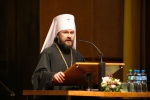Celebrations marking the first anniversary of the meeting in Havana take place in Fribourg
On 12 February 2017, special events on the occasion of the first anniversary of the historic meeting in Cuba between Patriarch Kirill of Moscow and All Russia and Pope Francis were held at the University of Fribourg, Switzerland, with the participation of Metropolitan Hilarion of Volokolamsk, chairman of the Moscow Patriarchate’s Department for External Church Relations, and Cardinal Kurt Koch, president of the Pontifical Council for Promoting Christian Unity.
The events were organized with the assistance of the Swiss Bishops’ Conference, Msgr. Charles Morerod, Bishop of Lausanne, Geneva and Fribourg, and the Institute for Ecumenical Studies of the University of Fribourg. At the beginning of the meeting Metropolitan Hilarion and Kurt Cardinal Koch gave a press conference to the Swiss mass media.
As the DECR chairman noted, the anniversary of the Havana meeting gives an opportunity to ponder on its importance and to discuss its first outcomes and prospects of the Orthodox-Catholic relations. Metropolitan Hilarion and Cardinal Koch emphasized the importance of organizing such annual events seen as an impetus to the development of cooperation between the Orthodox and the Catholics in the light of the Joint Declaration signed by the Primates of the two Churches in Havana on February 12, 2016.
The grand meeting took place at the Assembly Hall of the University of Fribourg. Among those who attended it were numerous hierarchs and clergymen of the Moscow Patriarchate and other Local Orthodox Churches, as well as of the Roman Catholic Church and the Protestant communities: Metropolitan Jeremiah of Switzerland (Patriarchate of Constantinople); Archbishop Job of Telmessos, representative of the Patriarchate of Constantinople to the World Council of Churches; Archbishop Michael of Geneva and Western Europe (Russian Church Abroad); Bishop Andrew of Austria and Switzerland (Serbian Orthodox Church); Msgr. Charles Morerod, Catholic Bishop of Lausanne, Geneva and Fribourg; Archpriest Mikhail Gundyaev, representative of the Moscow Patriarchate to the World Council of Churches; and many others.
Opening addresses were delivered by Msgr. Charles Morerod, Metropolitan Jeremiah of Switzerland, and Ms Marie Garnie, State Counsellor of the Canton of Fribourg. Bishop Charles Morerod greeted all those present on behalf of the Swiss Bishops’ Conference and thanked the organizers of the meeting for choosing Fribourg as the venue for celebrating the first anniversary of the Havana meeting that had given a fresh impetus to the Orthodox-Catholic dialogue. Metropolitan Jeremiah noted the importance of the efforts of the Patriarchate of Constantinople and the Russian Orthodox Church, aimed at developing the inter-Christian dialogue in compliance with the words of the Saviour, That … all may be one (Jn 17:21). As Counsellor Marie Garnie pointed out, it is symbolic that Fribourg, a crossroad of languages, cultures and various religious traditions was chosen for holding the special events marking the first anniversary of the meeting of the heads of the two Churches.
Metropolitan Hilarion of Volokolamsk and Kurt Cardinal Koch were keynote speakers at the grand meeting.
As the DECR chairman emphasized in his address, the meeting in Havana was historic not only because it was the first ever meeting of a Primate of the Russian Orthodox Church and a Bishop of Rome, but also because it was a visible expression of the level of trust and mutual understanding recently attained by the two Churches, which opens up new perspectives for the Orthodox-Catholic relations. The meeting, intentionally organized in Latin America, far from the longstanding disputes of the “Old World”, is to predetermine many of the two Churches’ decisions and actions and to make its contribution to the development of international and social relations. Metropolitan Hilarion noted that the issue of martyrdom as the seed of Christianity in the past and at present was the central theme of the Joint Declaration. Metropolitan Hilarion also mentioned the examples of the two Churches’ cooperation over the year that had passed after the meeting in Havana.
Cardinal Koch pointed out the historic nature of the meeting in Cuba that had considerably helped overcome the divisions still existing in the relationships between the Orthodox and the Catholics. Cardinal Koch spoke of the Joint Declaration as of a pastoral document conveying the comprehensive global vision. As the President of the Pontifical Council for Promoting Christian Unity emphasized, the Decalration dwells, among other things, on the problems that affect Christians and all people of good will, such as the persecution of Christians in various parts of the world, religious freedom, solidarity with the poor, role of young people, and mission of the Church in today’s world. Outlining the prospects of the Orthodox-Catholic cooperation in the follow-up of the Havana meeting, Cardinal Koch mentioned the three spheres: veneration of common saints, cultural cooperation and inter-church interaction on the most topical issues.
At the conclusion of the meeting the Swiss Choir In Illo Tempore performed religious compositions by the Orthodox and the Catholic composers, including Tomás Luis de Victoria, Vasiliy Titov, Francesco Soriano, and Metropolitan Hilarion of Volokolamsk.
DECR Communication Service






















